- Home
- Thomas Cahill
A Saint on Death Row Page 7
A Saint on Death Row Read online
Page 7
While setting up the terms of this visit, I had begged the prison authorities to allow a sacramental visit. What is that, they wanted to know. The archbishop, I replied, would like to bless the prisoner. To do this in the most effective way, he wishes to place his hands on the prisoner's head. To be truthful, I was not so much interested in achieving this result for the sake of the blessing itself. After all, a priest (or anyone, for that matter) can bless another through two sheets of glass— or across half a world, if necessary. It is the intention, not the proximity, that makes the blessing.
Dominique, like all Death Row prisoners of the State of Texas, was kept in solitary confinement and never touched by anyone. How horrible, I often thought, to be so confined as never to feel a human touch, except by way of coercion or humiliation. But the prison authorities would make no allowance for a sacramental visit, not even by a religious figure as famous and revered as Desmond Tutu. What if a prisoner wished to be baptized, I asked. Would you deny him that? No, came the even response, we do allow that—on the night before execution.
Since it is impossible to shake hands through panes of glass, the custom is for the prisoner to place his right hand, palm out, on his side of the glass, while his visitor, mimicking the prisoner's action, places his own right hand against the glass on his side—as close as the two can come to touching, though each touches only the cold rigidity of glass. As Dominique positioned his fire-scarred right hand against the glass, Desmond Tutu raised his own polio-weakened hand in response.
I left them to have their own private meeting, which was no doubt exceedingly sacramental and full of blessings. Sheila Murphy and I waited in an adjoining room, where after the first few minutes we could hear repeated peals of laughter from both men. As their visit proceeded through its hour and a half, joy continued to break out, sometimes uproariously. They were getting along just fine, as I knew they would, if more hilariously than anyone could have anticipated.
In the end, Tutu gave Dominique an inscribed copy of An African Prayer Book, the archbishop's own anthology of intensely beautiful African prayers from pharaonic times to the present, collected from virtually every African religious tradition, a project I had suggested to him. Published by Double-day in 1995, it has remained in print ever since. I mention it here because I believe its texts give off sparks of the eclectic, playful, and profound humanity of the conversation that took place that day. For those who would come closer to the deep meaning of this encounter between a monumental man and a Death Row inmate, the spirit of that day may still be sought in the pages of An African Prayer Book.
Like Jesus in his transfiguration, his secret encounter on the mountain with Moses and Elijah, those great figures of ancient Hebrew tradition, witnessed dimly by three of his earthbound disciples, Dominique in his meeting with Desmond found confirmation and exaltation—and strength to move forward to his appointed end.
As we exited the prison, Desmond, Sheila, and I were confronted by interviewers and camera crews from local television stations. When we reached St. Luke's, we found hundreds of reporters, as well as many church members, waiting for us. Somehow, the police who could not protect the archbishop earlier managed to be on hand for crowd control. What the archbishop had to say of Dominique was simple and eloquent. Over and over he repeated—on this day and in the days to come—that Dominique “is a remarkable advertisement for God.” Privately he reassured me that I had not been “hyperbolic” in my description of Dominique and that he had been “greatly enriched” by the encounter.
“I was very humbled to be in his presence,” said Tutu at the news conference in that sweet, hushed, but commanding voice of his, “because I felt I was in the presence of God. This is not the monster that many would expect or think, but a human being, a human being who has grown. He's like a flower opening and you see the petals come up, particularly when you see him speaking about his concern for others. He wasn't self-pitying. I'm glad I came. I come away deeply enriched from my encounter with an extraordinary man. He is a remarkable young man and it would be one of the greatest tragedies if someone like Dominique were executed.” He made a point of describing the rosary Dominique wears around his neck and its meaning. Many reporters found this particularly fascinating and used it in their stories.
Of the death penalty he said that it is “not a deterrent. I think it is an obscenity that brutalizes. As a believer, [I find it] the ultimate giving up, because our faith is a faith of ever-new beginnings. [If] you execute them, you say, ‘I close the possibility of them ever being able to repent and to change.’”
Of the prison he said, “Dominique spends twenty-three hours of a day in solitary confinement, with one hour for exercise, alone. Now that is torture. The punishment begins the moment you come into Death Row. The deprivation—can you imagine not being able to be touched? We did a high-five through the glass as it was, anyway.”
Of the prison guards and officials he said, “They were some lovely people, but I just wonder what effect working in that environment can have on people. It's so destroying—for everyone there.”
He spoke of his conversation with Bernatte Lastrapes, the widow of the victim: “She said she is pissed off Those are her lady-like words. She is pissed off because the white accomplice got off scot-free. That really has riled her and she thinks the other three should have the opportunity to begin again. She doesn't want Dominique Green executed. I hope we can correct what has been a gross miscarriage of justice.”
He spoke of the paradox of the American character: “You are a very generous people, Americans, and it is very difficult to square with your remarkable vindictiveness, which doesn't square with your remarkable generosity. [Dominique] has already been in jail eleven years. That's a huge slice of someone's life. I hope the attention will make other people involved so that it becomes a groundswell and people know this is not what we should be doing. Don't dehumanize yourselves as a society by carrying out the death penalty!”
Having done all he could do with words, Desmond Tutu turned to sacrament. He celebrated mass in a packed church, choosing in his sermon not to dwell on the subject of the press conference but on the feast of the day, Annunciation Eve, celebrating the encounter of Mary of Nazareth with Gabriel, the messenger from God who invited her to become the mother of Jesus Christ. He imagined Mary saying no: “‘What? Me!! In this village you can't even scratch yourself without everybody knowing about it! You want me to be an unmarried mother? I'm a decent girl, you know. Sorry, try next door.’
“If she had said that, we would have been up a creek. Mercifully, marvelously, Mary said, ‘Behold the handmaid of the Lord; be it unto me according to thy word,’ and the universe breathed a cosmic sigh of relief, because she made it possible for our Savior to be born.
“Mary was a poor teenage girl in Galilee and reminds us that transfiguration of our world comes from even the most unlikely places and people. You, the people of Livingston, Texas, are the indispensable agents of change. You should not be daunted by the magnitude of the task before you. Your contribution can inspire others, embolden others who are timid, to stand up for the truth in the midst of a welter of distortion, propaganda, and deceit; stand up for human rights where these are being violated with impunity; stand up for justice, freedom, and love where they are trampled underfoot by injustice, oppression, hatred, and harsh cruelty; stand up for human dignity and decency at times when these are in desperately short supply. God calls on us to be his partners to work for a new kind of society where people count.”
When mass was ended, Desmond Tutu stood at the church door and greeted each worshipper individually, shaking hands, embracing, somehow finding the right word for each of these encounters with strangers. By now, I could see, he was exhausted and his right hand and right side were giving him trouble. After he had unvested and resumed his street clothes, I was determined to get him into that limo and on his way as fast as possible.
He emerged from the sacristy and took in the scene, refusing to
be hurried toward his car. There, beyond the crowds of people who could not bring themselves to leave, beyond the rolling lawn of the church's property was a ring of uniformed police, beefy white men with crossed arms and reflective sunglasses, the only people Desmond Tutu had not yet greeted. With his customary smile hiding his grim determination, he forced himself to limp down the driveway to the edge of the road, where the cops stood, towering over his tiny figure. Though only five feet four inches tall, Tutu seemed at that moment to be shrinking to an even more diminutive size. Nevertheless, he shook the hand of each astonished policeman and thanked them, every one. Then he was ready to go.
After the limo had taken off, Dave Atwood of the Texas Coalition to Abolish the Death Penalty murmured to no one in particular, perhaps to the now bright air in the glow of the afternoon sun, “Livingston will never be the same.” The visit suffused Dominique and his fellow Death Row prisoners with fresh optimism. They knew perfectly well that all the forces that were ranged against them were still in place, but they now had the best champion they could ever have conjured up and he had brought the world to Livingston as witness to their pain. One prisoner, Kenneth Foster Jr.,∗ expressed his enthusiasm in a poem entitled “The Anointing”:
Three cheers for Tutu,
the Catholic Zulu,
our black pope,
who smiled upon Death Row
and left tears as
spiritual libation
for dried souls to grow on.
Go on wit’ yo’ bad self, Desmond,
testing the morals of South Africa and
the dirty south,
trekking through the paths of
Black Death,
breathing
Green Life
for all willing
to be blessed with a
Holy Kiss
by lips that know how to speak a
Peace Beyond Understanding.
We stood hand in hand with you,
and still do,
hoping to remain the prayer in your heart
that asks for forgiveness of our souls
in a land barren of mercy,
bearing our crosses,
buried in the steel of
Texas Death Row!
Despite the buoyant optimism we all felt that day, the possibility of success against the machinery of Texas “justice” remained minuscule. The story of Desmond Tutu's visit was picked up by media throughout the country and beyond, but it was all a momentary wonder; within a day or two, the country and the world had many other things to think about. In a foreshadowing of what was to come, I noted that not a few published reports were garbled, incomplete, even malicious. Tutu had talked at length about his telephone conversation with the widow of the victim, though, as he explained, he had been unable to meet with her because she had just been hospitalized. There was no report of this in the Houston Chronicle, however, merely a quote from Diane Clements, president of an organization called Justice for All. “I guess Desmond Tutu forgot to visit the family of Andrew Lastrapes,” asserted Clements ignorantly. Later, I learned that the reporter had included an account of Tutu's conversation with Bernatte Lastrapes in her story but that it had been excised by an editorial pencil and the quote from Clements set in its place. In other press accounts, Clements and others dismissed Tutu's visit to Livingston by claiming it was only in aid of his promoting his latest book, God Has a Dream—which he may have promoted on his speaking tour but which was never mentioned the entire time he spent in Livingston.
In fact, prior to the archbishop's visit Sheila Murphy and Dave Atwood had been trying for some time to locate Bernatte Lastrapes. Once they had found her and were able to connect her with Tutu, they were also able to make contact with her sons. Two of these, Andrew and Andre, who had been twelve and ten respectively when their father was killed, began to visit Dominique. Soon the three men, all of the same generation, all black Houstonians who had grown up in straitened circumstances, were fast friends. But Dominique could no longer wear his rosary when he met visitors. A new rule just happened to forbid the wearing of rosaries, which were now seen as “security threats.” In a letter to me, Dominique wondered, “Are they actually labeling God as a security threat?”
In my response, I took some time to give Dominique a sense of who I believed he was and at the same time to offer him the sort of literary discourse I knew he craved:
You have, I'm sure, had to put up with petty harassments of this sort for years. When people have unlimited power over others, we know they will be tempted to abuse that power. Some men and women are even drawn to professions that will give them such power: there are not a few teachers, clergy, nurses, police, prosecutors, who take the jobs they take because of the enormous license these jobs give them to abuse other human beings. And if such is true of these common professions, how much truer it must be of the unusual profession of prison guard. Psychology of course tells us that it is the abused who end up as abusers, it is those who have been beaten who wish to beat, those who have been belittled who wish to belittle, those whose souls have been destroyed who need to destroy the souls of others. You must have figured this out a long time ago; and I'm sure you know that these psychological traits are not so fated or predetermined that the afflicted person can do nothing to change himself. The abused does not have to become an abuser. He can reflect on his history, come to see it for what it is, and make the decision not to repeat history, not to do to others what was done to him. That is always an immensely courageous decision, one that requires the bravery to look squarely at one's own history and name it accurately, then the courage to rein in one's own evil tendencies. It takes a mind and a heart working together—rather than rigidly separated from each other, even unknown to each other as so many people's minds and hearts are.
No one survives childhood without some such scars. The English poet Philip Larkin has a funny poem on the subject, called “This Be the Verse”:
They fuck you up, your mum and dad.
They may not mean to, but they do.
They fill you with the faults they had
And add some extra, just for you.
But they were fucked up in their turn
By fools in old-style hats and coats,
Who half the time were soppy-stern
And half at one another's throats.
Man hands on misery to man.
It deepens like a coastal shelf.
Get out as early as you can,
And don't have any kids yourself.
For my money the poem misses greatness because in the last stanza the poet loses his nerve. Yes, he makes us laugh, but he also wants us to despair as he despairs—to agree with him that our condition is so hopeless that the obliteration of the human race would be preferable to the continued reproduction of new human beings—that this would be the best outcome we could “hope” for, which would actually entail the death of any kind of real hope. This is true cynicism, which I'm sure you have had to endure a great deal of.
I prefer the solution of a poet like the nineteenth-century priest Gerard Manley Hopkins, who is sensitive to the terrible tragedies that human beings inflict on one another, so sympathetic that his pain on behalf of others is sometimes the realest, most physical element in his poems. He has a poem called “Brothers” in which he sits watching a school play. Next to him is a boy whose younger brother is acting in the play and Hopkins feels all the older brother's anxiety on behalf of his younger sibling, his hope for his brother. He doesn't bother to tell us whether the younger boy performed well or not. His only point is the older brother's sympathetic suffering. The poem ends:
Ah Nature, framed in fault,
There's comfort then, there's salt;
Nature, bad, base, and blind,
Dearly thou canst be kind;
There dearly then, dearly
I'll cry thou canst be kind.
It's almost an answer to Larkin, even though it was written a century earlier. Hopkins doesn
't deny how horrible human beings can be to one another; in fact, he acknowledges it (“bad, base, and blind”). But he points out another phenomenon, the reality of human sympathy, which in the end is the only thing that can redeem us from Larkin's (or anyone else's) despair.
To be hopeful is to be courageous. You certainly can't be hopeful without courage because each day is fraught with examples of what Larkin is talking about. To be hopeful is to steel ourselves against all the obvious and easy reasons to despair and, instead, to choose to hope.
I hope none of this sounds like I'm lecturing you. I'm just trying to give you some idea of who I think you are and why I have such admiration for you. The easy thing (always, everywhere) is to despair, to give up; the hard thing, the thing that takes interior, invisible strength, is to hope. In this business, I'm sure you could teach me much more than I could teach you….
As I say to my own children (who are at such a distance, one in California, the other in the Czech Republic, both about your age): a big hug.
Love,
Tom
In a letter of mid-April to Marco Gnavi, the Sant'Egidio priest, Dominique, despite the misgivings that he kept mostly to himself, continued to express high hopes for a positive outcome to his case: “Tomorrow some reporter from South Africa is coming over to see me. Who knows just what all this will grow into? My hope is that the attention will continue to increase until enough is generated that I will have a platform to save my life.” But Texas was deaf to any music but its own; and Sheila Murphy's legal advocacy had begun too late to have any but a marginal effect on Dominique's chances.
Dominique's legal team had filed a second habeas corpus petition, this one in federal court, but in February 2002, the U.S. District Court dismissed it and denied a certificate of appealability. In October 2003, the U.S. 5th Circuit Court of Appeals denied Dominique's request to appeal the U.S. District Court's denial of the federal habeas petition. In February 2004, Dominique petitioned the U.S. Supreme Court for the second time for a writ of certiorari, which, if granted, would initiate a Supreme Court review of the lower court's decision in Dominique's case. That June, however, at a hearing in the Harris County Courthouse, Dominique was given his death date—October 26—even though the Supreme Court had yet to rule. (Sheila and many others suspected that Harris County officials were determined to execute him prior to election day 2004, because the Harris County district attorney, Chuck Rosenthal, was running for reelection against a quasi-anti-death-penalty black candidate and the insiders didn't want Rosenthal's run clouded by this unresolved case.)

 How the Irish Saved Civilization
How the Irish Saved Civilization The Gifts of the Jews
The Gifts of the Jews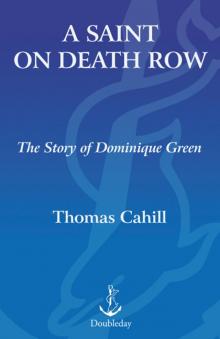 A Saint on Death Row
A Saint on Death Row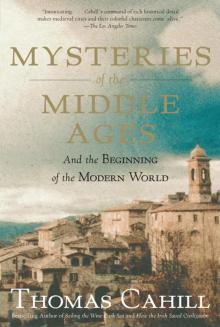 Mysteries of the Middle Ages
Mysteries of the Middle Ages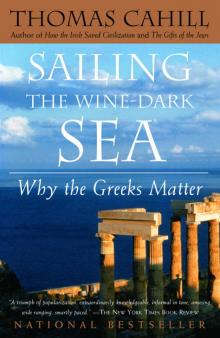 Sailing the Wine-Dark Sea
Sailing the Wine-Dark Sea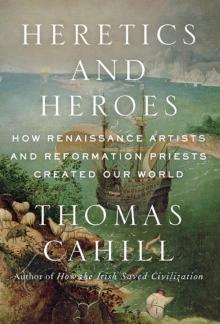 Heretics and Heroes
Heretics and Heroes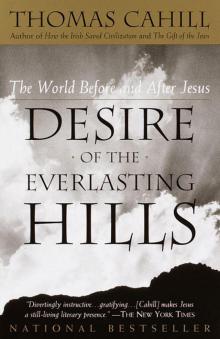 Desire of the Everlasting Hills
Desire of the Everlasting Hills